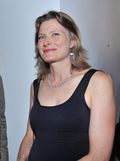Meow Much?
By Sarah
 Contrary to frequent lies I told my daughter throughout grade school, the playground never really disappears. There will always be the cool kids and their innately exclusive four-square game, the superior athletes zipping across the monkey bars and the outcasts doing their own thing, mostly trying not to get hit with one of those red rubber balls.
Contrary to frequent lies I told my daughter throughout grade school, the playground never really disappears. There will always be the cool kids and their innately exclusive four-square game, the superior athletes zipping across the monkey bars and the outcasts doing their own thing, mostly trying not to get hit with one of those red rubber balls.
Never was the female literary playground more active than last week when recent Pulitzer winner  Jennifer Egan, in trying to needlessly impress a Wall Street Journal reporter, noted:
Jennifer Egan, in trying to needlessly impress a Wall Street Journal reporter, noted:
My focus is less on the need for women to trumpet their own achievements than to shoot high and achieve a lot. What I want to see is young, ambitious writers. And there are tons of them. ....There was that scandal with the Harvard student who was found to have plagiarized. But she had plagiarized very derivative, banal stuff. This is your big first move? These are your models?…My advice for young female writers would be to shoot high and not cower.
The blogs went wild in indignation. Jennifer Weiner, for whom I have both high respect and curious bewilderment, ran with it on Twitter, trouncing Egan for being so quick to draw the line between Her and Us, lest there be any confusion. Egan was on the monkey bars, flying high. We chicklit writers were rubbing our heads and wondering how come the rubber ball. What did WE do?
 Finally, after a year of Franzenfroid (led, in part, by Weiner), a female author whose novel, A Visit from the Goon Squad, blew me away wins the Pulitzer and immediately trashes my personal heroes, women who write, ahem, "very derivative, banal stuff." (Note that Egan did not get on the case of Harvard student Kaavya Viswanathan for plagiarizing - just for plagiarizing Sophie Kinsella, Meg Cabot and, especially, Megan McCafferty. Nice.)
Finally, after a year of Franzenfroid (led, in part, by Weiner), a female author whose novel, A Visit from the Goon Squad, blew me away wins the Pulitzer and immediately trashes my personal heroes, women who write, ahem, "very derivative, banal stuff." (Note that Egan did not get on the case of Harvard student Kaavya Viswanathan for plagiarizing - just for plagiarizing Sophie Kinsella, Meg Cabot and, especially, Megan McCafferty. Nice.)
But what I found so interesting was not merely Egan's comment - a grasping quip one might overhear during orientation at the MacDowell Colony - but the reaction among women writers like Weiner and, okay, like me. After all, I was once dubbed (way erroneously) by People magazine as The Chick Lit Queen so I get to claim a hooker spot on the corner of Banal and Derivative, too.
Our reaction was not simply a "how dare she" moment. Our reaction - and maybe yours - goes to an essential primitive question about female relationships:
Why must women consistently divide themselves from other women?
Because we do. Even when we don't want to.
If we were honest with ourselves, we'd own up to the fact that we mentally, even subconsciously, search for ways in which we are like or not like others in our gender. Right away, we go to appearance. There are those of us who are "overweight" and those of us who "aren't." Big divider. After that, it's those of us who work vs. those of us who don't. Those who spend money on their hair/nails/bodies and those of us who channel our precious financial resources toward other  endeavors. Those who read. Those who watch. Married. Single. Educated. Not. In rapid fire analysis, we can define how a woman is alike/not like us within five minutes of waiting for a dressing room door to open.
endeavors. Those who read. Those who watch. Married. Single. Educated. Not. In rapid fire analysis, we can define how a woman is alike/not like us within five minutes of waiting for a dressing room door to open.
I'm sure the underlying reason is somehow biological.
Now, take that process and apply it to women competing in a field still dominated by men and watch out. The competition can be vicious.
Recently, a mega successful author confided to me that she had no author friends. "It's as if," she said, "they think readers will only read one book a year." When she said this, I went blank because this has not been my experience at all.
Partly, that's because I forced myself early on never to check my work against that of the kid next to me. Also, this is my second career. I didn't really start writing fiction until my late thirties. By that time, I was so grateful to be free from cantankerous newspaper editors, to have found a way to earn money from home while my kids were small, that such things as not rising as fast up the bestseller list as my contemporaries didn't bug me. Much.
(Though I will admit that while in weakness I might look to Weiner, whose career started when mine did and who immediately jumped to the top of the NYT list, I shamefully never, ever compare myself to men. Never.)
I also owe a lot of my sisterly feeling to this blog and to Nancy Martin's attitude that we ALL benefit when we promote  each other. For one thing, it's fun. Writing is so solitary that it feels good to connect with other writers and you really do find yourself cheering for their successes almost as much as your own. For another, it's simply good for the soul. Karma and all that.
each other. For one thing, it's fun. Writing is so solitary that it feels good to connect with other writers and you really do find yourself cheering for their successes almost as much as your own. For another, it's simply good for the soul. Karma and all that.
And maybe this is the advantage of getting older. You begin to learn that those words you slaved over ten years ago are selling for $.50 on the used book table at the PTA fundraiser. It's all dust in the wind, folks. Best not to take it seriously.
That goes for Egan, too. And Thomas Berger, N. Scott Momaday, Adam Haslett and other Pulitzer winners whose names, alas, have not exactly won the traditionally female honor of being called "household." Also, for Weiner, Kinsella, Cabot, McCafferty and Strohmeyer.
Pulitzer or not, chicklit or post modern post modernism, let us never forget John Updike's last days,  struggling to remember what he'd written, who he was.
struggling to remember what he'd written, who he was.
Wait. He said it better himself - of course - in his last poem: Requiem.
It came to me the other day:
Were I to die, no one would say,
"Oh, what a shame! So young, so full
Of promise — depths unplumbable!"
Instead, a shrug and tearless eyes
Will greet my overdue demise;
The wide response will be, I know,
"I thought he died a while ago."
For life's a shabby subterfuge,
And death is real, and dark, and huge.
The shock of it will register
Nowhere but where it will occur.
Kind of deflates the red rubber ball, huh?
Sarah



